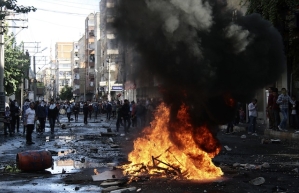
The Kurdish minority, protesting the refusal of Turkey's government to help besieged Kurds and take out Islamic State fighters in the Syrian border town of Kobani, turned to riots across the country, resulting in the deaths of 21 people.
The street battles, which were conducted between Kurdish protesters and police, happened in Istanbul, Ankara and southeast Turkey, where there is a sizeable Kurdish minority population that outnumbers the Turks. According to an Associated Press report on Yahoo, police used water cannons and tear gas to disperse protesters who burned cars and damaged businesses.
"They [in Kobani] are Kurds too, just like us," said Erdal Yigit, 32, a resident who lives in southern Turkey. "Those who attack them could attack us one day."
To quell the riots in regards to Kobani, Turkish authorities have imposed curfews across five provinces and canceled domestic flights within Turkey. According to a report from Reuters, it has been the first time such measures have been used widely since the early 1990s.
An article in the Wall Street Journal noted that although the fall of Kobani to ISIS was imminent, based on declarations from both the U.S. and Turkish President Recep Tayyip Erdogan, the coalition continued pounding the extremist group with airstrikes. U.S. Central Command stated that drones and fighter jets have obliterated an armored personnel carrier, four armored vehicles and two pieces of artillery around Kobani.
A spokesman for the Kurdish militia defending Kobani, Redur Xelil, said that the air raids have helped them fight back against ISIS fighters, who now control wide areas in Syria and Iraq.
"For the first time, the U.S. strikes had some effect," Xelil told the Wall Street Journal. "They helped us push back many of the fighters from eastern Kobani, but clashes still continue."
Erodgan and Kurdish leaders did have one thing in common though: both sides thought the airstrikes were both ineffective and insufficient in taking out ISIS. Asya Abdullah, co-chair of a political faction in Syria's Kurdish region, noted that the danger is growing from ISIS in spite of the air raids.
"If these strikes continue to be as successful, they may help us to defend the city," she said to the Wall Street Journal. "But [Islamic State] has started to send more fighters and heavy weaponry here, so the clashes will continue to be heavy in eastern Kobani."
According to Reuters, the fallout of the war against ISIS in Syria and Iraq has threatened to unravel a delicate peace process between the Kurds and Turkey, a member of NATO. It has also exposed the difficulty that Washington has faced to build up a cohesive coalition to take out ISIS in the region.







